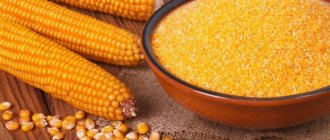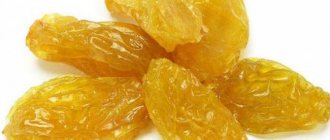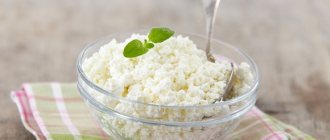Low-fat cottage cheese
Cottage cheese is a unique product in its composition. Its beneficial properties include providing preventive and healing measures in relation to the human body. You can either purchase it in a store or make it yourself. The benefits of cottage cheese are quite great, and the taste is simply amazing.
Benefit
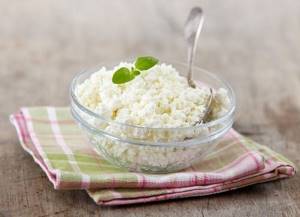
It has a grainy texture and a pleasant taste. But besides this, it also has beneficial properties for the human body. That is why it is recommended for use by both adults and children. The beneficial properties of cottage cheese lie in its unique composition. Thanks to the components, it is quickly absorbed by the body.
It contains a large amount of protein, which helps to establish and normalize the functioning of the human digestive system.
Beneficial properties are also manifested in the ability to strengthen the skeletal system. This is due to the high calcium content, which strengthens not only bones, but also has a beneficial effect on the general condition of hair, nails and teeth.
The calorie content of cottage cheese is low, so many nutritionists recommend including it in the diet during diets and fasting days. You cannot get better from it if you consume it in small quantities. But in these cases you need to pay attention to the fat content of the cottage cheese. It is divided into such subgroups as:
- · Fat.
- · Classic.
- · Low-fat.
- · Low fat.
The highest percentage of fat is 23, and the lowest is 1. The beneficial properties do not change regardless of the fat content; this only affects the calorie content of the product. The higher the percentage, the higher it will be.
This fermented milk product was even recognized by official medicine. She confirmed that thanks to its composition, it can significantly strengthen the immune system and give excellent health. It has a positive effect on the liver and intestines. Perfectly helps to cope with diseases of the kidneys and gastrointestinal tract. Helps with a sick heart and has a positive effect on blood vessels.
Cottage cheese is recommended for people suffering from lung diseases. Regular consumption helps normalize hemoglobin levels in the blood. This is especially useful during the period of bearing a child. Pregnant women should eat at least 100 grams. product per day. Its nutritional value will help not only satisfy hunger, but also compensate for the deficiency of calcium and iron in the body of a pregnant woman. For the unborn baby, cottage cheese does not pose any danger; it helps strengthen his skeleton and form the nervous system. But this is only relevant in cases where the woman herself has no contraindications to use for health reasons.
Cottage cheese helps improve memory. It has a great effect on brain performance and promotes concentration.
Cottage cheese is also irreplaceable for nursing mothers. It increases lactation, resulting in more milk. If a nursing woman consumes cottage cheese, she may not worry about the health of the child. It does not cause diathesis or allergies.
People with poor eyesight simply need cottage cheese. It boosts it thanks to the vitamin A contained in this product. The beneficial properties of cottage cheese are also manifested in its ability to “adapt” to the body of any age. It will help older people to strengthen the musculoskeletal system, and will help the growing body in its faster development.
Harm
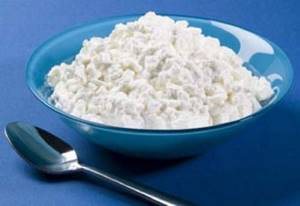
This can happen when a person does not take into account all the contraindications to its use. Cottage cheese has the ability to increase cholesterol. The higher the percentage of fat content in a product, the greater the likelihood of such a side effect, which can even lead to the development of atherosclerosis in humans. Elevated cholesterol levels are also dangerous for overweight people. It promotes the formation of plaques, thereby slowing down the body's basic processes. Therefore, if the cottage cheese is fatty, it is not recommended to consume more than 100 grams. in a day.
Excessive amounts of protein contained in cottage cheese can negatively affect kidney function. Due to the fact that cottage cheese is a fermented milk product, it becomes a “favorite” place for the development and habitat of various E. coli, which can lead to food poisoning or serious intestinal diseases. Therefore, the product consumed must be fresh.
The shelf life of cottage cheese should not exceed 2 days. This applies to both home and industrial products.
Calorie content
Cottage cheese varies in structure, method of preparation and fat content. The main indicators of the product depend on these factors. The calorie content of cottage cheese depends on the percentage of its fat content. The fattest product is considered to be 23%. But it can rarely be found on store shelves. Often, such cottage cheese is prepared and consumed at home, without being sold due to its short shelf life. The most consumed varieties are cottage cheese 18%, 9% and 1%. It is their calorie content that is presented in the table below.
| Fat percentage (in%) | Calorie content per 100 g. |
| 18 | 230 |
| 9 | 160 |
| 1 | 90 |
Their caloric content varies, but in order to understand how many calories certain measures contain, it is worth looking at the table below. For example, take cottage cheese with a medium fat content of 9%
| Unit of measurement | Calorie content | Weight (g) |
| 100 gr. | 160 | — |
| 1 glass | 160 | 100 |
| 1 tablespoon | 32 | 20 |
| 1 teaspoon | 8 | 5 |
The beneficial properties of the product are in no way reflected in its fat content. But the higher the calorie content of cottage cheese, the more harm it can cause to health if consumed in excessive quantities. Therefore, you should not exceed the limit of 100 grams. daily consumption.
Contraindications
Cottage cheese benefits the body only when consumed correctly. But there are also contraindications for health reasons when it is not recommended in order to avoid complications.
Contraindications:
- Atherosclerosis.
- Increased level of cholesterol in human blood.
- Obesity.
- Diseases associated with calcium metabolism in the body.
The most important condition is that the product must be fresh and its daily intake should not exceed 100 grams. consumption. Taking these nuances into account, the body will receive only useful substances from consuming cottage cheese.
Application
In folk medicine, cottage cheese has proven itself as a healing product since ancient times. It is used to treat anemia and osteoporosis. With its help, it is possible to normalize metabolism and improve overall health. Regular consumption of cottage cheese also helps lower blood pressure.
Cottage cheese is great for burns. It relieves pain and inflammation. They can also relieve pain from bruises and various blows. Cottage cheese in combination with honey can reduce swelling and abscesses on the human skin.
In the cosmetology industry, cottage cheese has no equal. It is used to make face masks that help preserve youth and smooth out wrinkles. It perfectly moisturizes the skin. A curd mask will also help overcome freckles. It will significantly reduce the appearance of pigmentation and brighten the skin.
Storage
It is very important to distinguish between cottage cheese and curd product. These two concepts are similar to each other, but the second has more chemical additives, due to the use of which its shelf life increases. Cottage cheese is stored for no more than 2-3 days at home, and the cottage cheese product is stored for 10-15 days.
Most often, cottage cheese is stored in the refrigerator. It is better to opt for metal or enamel dishes. Do not store in plastic bags or plastic. The temperature in the refrigerator should not be higher than 8 degrees. It can also be stored in a cool place, the air humidity should not exceed 15 degrees Celsius. In such conditions, the cottage cheese retains its freshness for 2-3 days.
But you can significantly extend the shelf life of cottage cheese by placing it in the freezer. In such conditions it can be stored for up to two months. The temperature should not be below 35 degrees.
To increase shelf life, it is better to purchase cottage cheese in vacuum packaging.
The nutritional value
Despite the fact that the calorie content of cottage cheese is relatively low, its nutritional value can perfectly saturate the body with all the necessary substances.
Table: Nutritional value
| Name | Percentage |
| Carbohydrates | 2 |
| Squirrels | 22 |
| Water | 68 |
| Fats | 8 |
Vitamins and minerals
The main part of the vitamin in cottage cheese comes from B vitamins.
Table: B vitamins
| Name | Amount (mg.) |
| 1 | 0.04 |
| 2 | 0.28 |
| 5 | 0.29 |
| 6 | 0.11 |
| 9 | 350 |
| 12 | 100 |
It also contains vitamins of other groups:
| Name | Amount (mg.) |
| A | 0.05 |
| PP | 0.4 |
| H | 5 |
| E | 0.3 |
| D | 0.30 |
| C | 0.5 |
| PE | 54 |
It is rich in microelements and minerals such as:
- · Cobalt.
- · Iron.
- · Zinc.
- · Calcium.
- · Potassium.
- · Phosphorus.
- · Chlorine
- · Selenium.
- · Molybdenum.
- · Manganese.
- · Sulfur.
Cottage cheese is one of the most ancient products. It has earned the title of national product because of its origins. The value of cottage cheese lies in its ability to saturate the body with essential nutrients. It is often used in folk medicine and cosmetology. Nutritional value, vitamins and low calorie content make this product irreplaceable.
Cottage cheese: the benefits and harms of this product are still controversial among many people. But one thing remains the same. By consuming cottage cheese, vitamins enter the body, having a positive effect on it.
prodgid.ru>
Is it possible during pregnancy and lactation?
Cottage cheese should always be included in the diet of women expecting a child. The baby inside the mother needs a lot of calcium and iron. If the mother does not receive the necessary substances from food, the child will take them from the mother's body.
A nursing mother simply needs a delicious fermented milk product. After all, her baby, through breast milk, receives all the vitamins, minerals, and trace elements required for growth and development. One of the most necessary and important microelements is calcium. With its deficiency, the baby's bone and nervous systems develop with a delay.
The norm for a pregnant woman and a nursing mother is the same - 100 grams of low-fat cottage cheese per day. An increased portion can cause severe stress on the kidneys.
Low-fat cottage cheese - benefits and harms
A lot has been written about the benefits of cottage cheese. And there is probably no such person who would not taste this product. Both adults and children consume it, enriching their body with vitamins and essential microelements.
Today on the market you can find a huge selection of cottage cheese, it differs only in the percentage of fat content (0%, 3%, 9%, 15% and 18%) and the manufacturer, the composition, as a rule, differs little: protein, B vitamins, vitamins A, C, D and PP, calcium, iron and magnesium. What to choose is up to you to decide.
Low-fat cottage cheese has become a favorite product of all those losing weight and athletes; it contains a lot of protein, which promotes the formation and restoration of muscle tissue. Nutritionists and doctors disagree on whether low-fat cottage cheese is healthy. So let's figure it out.
The benefits of low-fat cottage cheese
First of all, cottage cheese is a source of calcium, which is so necessary for strengthening bones and blood clotting. In addition, protein is a building material for our body, and phosphorus is responsible for the health of teeth, nails and hair.
Harm of low-fat cottage cheese
Despite a lot of positive properties, everything “has its own fly in the ointment.” Low-fat cottage cheese does not cause significant harm, but some beneficial properties in it are significantly reduced.
To absorb calcium, we need fats, and since cottage cheese is low-fat, the digestibility of the product is reduced. Due to defatting, very little phospholipids, lecithin and cephalin remain in the cottage cheese - these are components of milk fat that take part in the transmission of nerve impulses. Cottage cheese without fat is much poorer in vitamin content than its fatty counterpart, so it is better to opt for low-fat cottage cheese in order to maintain its beneficial properties and not harm your figure.
WomanAdvice.ru>
Correct usage
A person’s well-being directly depends on how healthy and balanced he eats. Low-fat cottage cheese is healthy - there is no doubt about it. But you shouldn’t accept it thoughtlessly.
- The volume of the portion eaten at a time and the frequency of intake depend on the age, state of health of the person and the goals that he wants to achieve.
- It is better to give special curds to children under three years of age. Cottage cheese without fat is introduced into the child's food after reaching the age of three, the portion is 75 g per day.
- For women expecting a baby and nursing mothers, the norm of 150 - 200 g is optimal. An increased dose may cause an increase in load on the renal system.
- Athletes who are keen on bodybuilding are also advised to use a low-fat fermented milk product. Norm: 100 g of cottage cheese 0% one hour before training to replenish muscle mass with protein and 100 g half an hour after the end of training to renew expended energy.
- For those wishing to lose weight, the optimal norm is no more than 200 g per day in small portions.
- If you just love cottage cheese, try not to overeat and stick to a small portion - 100 - 200 g per day.
Nutritionists suggest eating low-fat cottage cheese at night, 1 - 2 hours before bedtime. Overnight, curd protein is completely absorbed, not being stored in fat, but completely nourishing the muscles and the entire body.
Cottage cheese - beneficial and harmful properties of fermented milk product
Cottage cheese - benefits and harm - this is a topic that we will now try to talk about. Cottage cheese is the most valuable and delicious fermented milk product, its benefits have been proven for a long time. It takes its rightful place among the many products that are necessary to maintain the normal state of the human body.
It is made from natural milk using ripening, separating the curds from the whey. For this process, lactic acid bacteria are used. At the same time, all useful and important substances for the body remain in the cottage cheese. The product is a white or yellowish mass with a pleasant odor. It tastes soft and delicate. There is no exact information about when it appeared, but it has been proven that it was used many centuries ago.
Cottage cheese classification
Today our industry represents a wide variety of this product. There is a qualification that is based on the percentage of fat, so there are several types of fat.
- Fatty.
- Classical.
- Bold.
- Low-fat.
- Low fat.
Fat cottage cheese is quite high in calories, while low-fat cottage cheese contains about 90 kcal. Low-fat and grain-based are very good for helping you lose weight. In addition, this dairy product can be acidic or acidic-rennet, depending on the starter used. Also nowadays, cottage cheese is made from different types of milk. Therefore, a product is prepared from natural milk, normalized, reconstituted and recombined.
I would also like to pay special attention to homemade cottage cheese, its benefits are much greater than its harm. It can be either fatty or low-fat, and you can also make it grainy. This product is made at home by heating fresh yogurt in a water bath. When the clot separates, the whey is decanted, and the resulting mass is placed under a press for several hours. Of course, it must be prepared with cleanliness and accuracy.
Composition of cottage cheese
- Carbohydrates.
- Squirrels.
- Fats.
- Vitamins A, B, E, etc.
- Calcium and phosphorus.
- Amino acids
Use in cooking
The benefits of cottage cheese make it a fairly popular food product.
You can prepare many dishes from it, such as dumplings, cheesecakes, cheesecakes, cottage cheese, etc. The industry also produces various delicious desserts based on cottage cheese, with the addition of fruits, which are loved by both adults and children. polzovred.ru>
How to choose
When purchasing low-fat cottage cheese, you must:
- Look at the manufacturing date and expiration date. Natural fermented milk products do not last long. If the expiration date is coming to an end, it is better to look for a fresher pack.
- The color of good cottage cheese is white, maybe slightly yellowish, uniform over the entire surface. If the mass has a pinkish tint, you should wait to purchase.
- The protein content on the label is within 15 – 20%.
- The taste and smell are sour and milky, without foreign impurities. The appearance of a moldy or rancid smell in the white mass, or an overly sour taste is a reason to throw it away without regret.
- Externally, low-fat cottage cheese looks elastic, crumbly, grainy, and there may be a slight appearance of whey.
- The composition of cottage cheese should not include any additives, only skim milk plus sourdough. The inscription on the package “curd product” indicates that this is an unnatural product; it contains food additives in the form of starch, flavorings, and stabilizers.
- When buying cottage cheese at the market, you should study the product documents from the seller and taste the product.
High-quality natural cottage cheese can be stored for no more than 4 days; anything longer contains preservatives.
You only need to take the package tightly closed. If stored improperly on the counter, the cottage cheese itself can contain pathogenic bacteria that can cause food poisoning.
There is no cottage cheese with 0% fat content - this is an advertising ploy. It is not possible to completely skim milk.
At home, in the refrigerator, this product must be stored in an airtight container. Cottage cheese absorbs all odors very quickly. There is no need to leave it in the bag, this will only speed up the souring process.
The color of high-quality low-fat cottage cheese is white; a minimum amount of whey is allowed.
Do I often hear about the dangers of low-fat cottage cheese? Is it so?
Alexey Popov (Ocean)
Benefits of low-fat cottage cheese
Low-fat cottage cheese: its benefits and possible harm is a topic of eternal debate among specialists and simply connoisseurs of this wonderful product. On the one hand, with a high fat content of cottage cheese, such an important element as calcium is less absorbed by the body, therefore, in this case, the benefits of low-fat cottage cheese can be argued. However, on the other hand, according to many scientists, there is little benefit from regular consumption of low-calorie and low-fat foods, due to the fact that they contain small amounts of vital polysaturated fats. The benefit of low-fat cottage cheese, like any other type of fermented milk product, lies in the calcium content, the amount of which is sufficient to cover the body’s daily needs. In addition, milk protein and vitamin B12 fix cartilage and bone tissue, and this is an excellent prevention of osteoporosis and atherosclerosis.
Harm of low-fat cottage cheese
The harm of low-fat cottage cheese is a rather abstract concept, since in this case, either something that is spoiled or expired, or something that has been consumed in excessive quantities is considered dangerous. Just try not to eat more than 400 grams per day of dishes using this fermented milk product, and also not to overuse sweetened curds. Consider this a harmful dessert, not a healthy treat. Carefully monitor the expiration dates of low-fat cottage cheese and there will be no harm to health.
Nos
a normal cow in a home stall produces milk with a fat content of up to 4% (if fed well, then more). Calculate how much fat the cottage cheese made from native milk will have if I skim the cottage cheese top to bottom. And what they sell to you in the store is passed through separators several times, foamed, grained, crushed, saturated - where is the benefit?
Raspberry)
In general, cottage cheese is useful because it contains calcium, and calcium is not absorbed without fat... the fattier the cottage cheese. the more calcium will be absorbed, but again, if you eat kilograms of it, then it won’t be absorbed either, in general, if you want to get benefits from cottage cheese, then eat fatty cheese, but not a lot)))
Composition, nutritional value
Low-fat cottage cheese is similar in composition to regular cottage cheese, with the exception of the fat content. The fat content usually varies between 0.1 and 2% per 100 grams. Despite the name, it is impossible to find a product with a zero value, since milk cannot be completely skimmed. The distribution of BJU will be as follows: protein - about 16 g, fat - 0.1 g, carbohydrates - 2.8 g.
Due to the low concentration of fats, this cottage cheese has virtually no cholesterol. But there is more calcium than in fatty foods: 170 mg per 100 grams of product versus 150 mg. Only it is not fully absorbed. In this regard, the ideal fat content would be 9%.
In addition, it contains:
- vitamins: B2, B3, B6, B12, A, PP, D, E, H;
- ascorbic acid;
- minerals: calcium, phosphorus, iron, magnesium, cobalt, molybdenum, selenium.
The calorie value usually fluctuates slightly, depending on the manufacturer. On average it is 80–95 kcal per 100 g.
How to store
Cottage cheese, like all fermented milk products, has a short shelf life.
If the curd is left in unsuitable conditions, pathogenic bacteria and infections quickly multiply in it. By eating spoiled food, you are guaranteed to get intestinal colic, belching, nausea, and diarrhea.
Therefore, it is necessary to ensure storage conditions and check the shelf life of the product. If it runs out, the cottage cheese must be thrown away without regret.
After the pack is brought home and opened, the mass should be transferred to a plastic or glass container and put in the refrigerator. Do not store opened curd mass in plastic bags.
The product can be stored at a temperature of 5 degrees for no more than a week.
